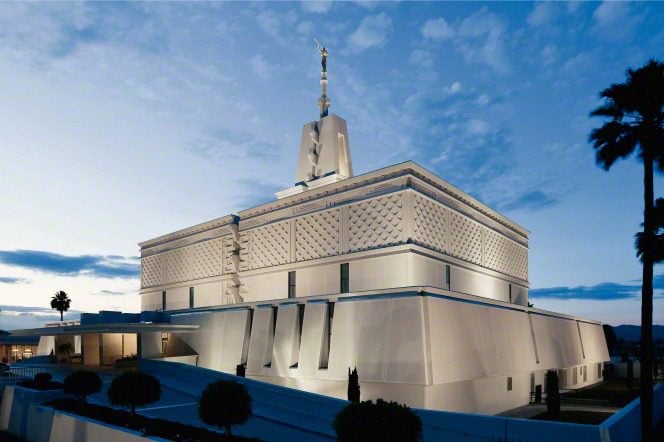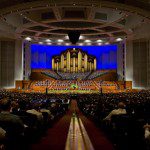
In my previous post — creatively titled “Big Questions (A)” — I responded to a reader’s concerns about the Church’s numbers being small and about the fact that even its numbered members too often have a hard time holding on. I continue my reply to him in this post. Here’s a continuation of his comment to me:
If we truly all passed the first estate with flying colors by following Christ’s plan why has this earth been such a hell hole for the majority of God’s children? Why did they have to suffer the sins of their fathers who caused the church to be taken from the earth 6 different times? It certainly wasn’t those spirits in heavens waiting to come down fault that their forbearers were wicked was it? The Plan of Salvation just seems so inefficient and selective. Why could’t God have helped just a little bit more? Isnt the Celestial kingdom going to be quite a lonely place? What think ye??
It’s true that, on earth, the Plan of Salvation is in one sense “selective.” As I pointed out in my prior response, that seems to be baked into the system. The scriptures not only acknowledge it but predict it. Whether it’s “inefficient,” though, is a distinct matter. Our ability to determine its efficiency or inefficiency depends on how well we understand the intention behind it. Efficient at doing . . . what, exactly? And on that question, although we understand what the end game is, what the Father’s ultimate goal is — “For behold, this is my work and my glory—to bring to pass the immortality and eternal life of man” (Moses 1:39); God “will have all men to be saved, and to come unto the knowledge of the truth” (1 Timothy 2:4) — I’m reasonably confident that we have a very weak grasp of the intervening steps in the process.
For my thoughts are not your thoughts, neither are your ways my ways, saith the Lord. For as the heavens are higher than the earth, so are my ways higher than your ways, and my thoughts than your thoughts. (Isaiah 55:8-9)
As to whether the Celestial Kingdom is going to be a lonely place, I rather doubt it.
For one thing, there are all those many millions of children who have died, and who continue to die, before the age of accountability. They’re apparently bound for the Celestial Kingdom. For another, I’m something of a quasi-universalist. (A topic for another day, that. And maybe not on my blog. We’ll see. To me, it’s a sacred and sensitive subject.)
But it seems to me that wickedness is what gets people into the Terrestrial Kingdom and the Telestial Kingdom. And indifference to truth is a species of wickedness. But those who sincerely seek to do right and to find and live by the truth will, I think, be fine in the long run. And those, in my still rather sunny view of humanity, is a pretty big group. Merely failing to accept a disputed proposition that one maybe didn’t even have the chance to fairly hear, or to hear at all, isn’t going to cost one the opportunity to return to the presence of one’s Father.
This whole question is one of the reasons I so love the gospel and the doctrines of the Restoration. I love the concept of salvation for the dead. I love temples. I do not fear for the future of the hundreds and hundreds of millions who have died without knowing the truth. (See, by the way, the solemn event described in this article, almost forgotten today but remembered by God: “100 years ago, US fought its deadliest battle in France.”) The news of the gospel is good beyond fathoming.
Finally, a note on another comment from this reader:
Why are there millions of Muslims marching to Mecca every year who are just as sold on their religion as the average LDS? Most of them will never convert in this life or maybe the next. BOM says “we will rise with same spirit as we had in this life.” Why did’t God cause Mohammad to be killed off in his early days before he could lead so many souls astray? After all God told Nephi “it was better for one man to perish than for a whole Nation to dwindle in unbelief.”
(First: I note the use of the verb marching. It suggests militancy. But the hajj pilgrimage isn’t militant or militaristic. It’s devotional. We should be careful not to use inflammatory and misleading language in such cases; there’s already too much heat and too little light in some contemporary Western conversations about Islam.)
I don’t know what the percentage will be, in the next life, of Muslim converts to the gospel. I have no idea whether it will be higher than the conversion rate among deceased Catholics or Buddhists or Sikhs or Shintoists, or lower, or the same.
As to why why God didn’t kill Muhammad off “in his early days before he could lead so many souls astray,” I don’t share your premise. I’m quite comfortable, to the contrary, with accepting Muhammad as divinely inspired. I agree with President Spencer W. Kimball and his counselors that Muhammad “received a portion of God’s light” and that “moral truths were given to [him] by God to enlighten whole nations and to bring a higher level of understanding to individuals.” I simply cannot see any plausible way of viewing Muhammad’s effect on seventh-century pagan Arabia as “leading souls astray” and causing the jahili Arabs to “dwindle in unbelief.” Quite the opposite, in fact.
If God didn’t kill genuinely evil men like Hitler or Stalin or Pol Pot or Mao off, why on earth should he have intervened to kill Muhammad? I don’t regard Muhammad as evil.
I’m confident that devout Muslims who sincerely tried to live up to the moral ideals of their faith and who sincerely sought God will be entirely okay, and much more than merely okay, in the eternities.












